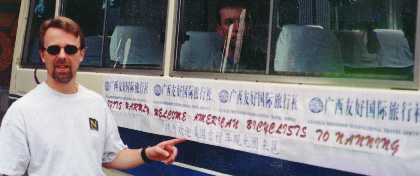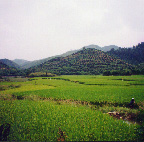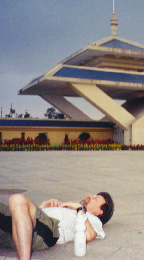
Rich & the Friendship Bus

|
|
The plan was for us to get adjusted with a short ride through the downtown area and then out into the countryside. About 18 miles north of town, we'd stop and visit a limestone cave. After that, we'd bus to an overlook that gave a great vista of Nanning. And something about a TV interview. The first order of business was to get acquainted with our bikes. The travel office was located behind the guarded gates of a government facility that had something of the appearance of a colonial enclave, with its ample shade trees and neatly groomed lawns. The bikes had apparently been acquired separately, and some of the group had concerns regarding toe clips and seats and in Bee's case, bar-ends to ease the strain on her hands. After some extensive fine-tuning with wrenches and other implements we pronounced ourselves ready to ride, undoubtedly to the relief of our hosts, who were unfamiliar with some of the idiosyncrasies of western cyclists. There's always a little frisson of excitement at the start of the first day of riding in a distant country. What will it be like? My God, we're really going to do it! It started out gently enough, around the grassy circle, back to the entrance, and then out on the tree-shaded lane that led to the main thoroughfare. And then we were into the maelstrom.
Nanning is not a frequent stop for tourists--by its count it only has about 5,000 foreign visitors a year. |
|
|
|
|
|
The thing that's disturbing to a cyclist is not so much the staggering profusion of fellow-travelers on motor scooters, cycles, motorcycles, and what-have-you, but the absence of any formal traffic system. During our stay in Nanning, I saw perhaps three intersections with traffic lights. In this country with a reputation for central planning and lack of individual freedom, I saw anarchy in action, and it wasn't as bad as government regulators (of any stripe) would have you believe. Those of us who live in Western democracies think nothing of sitting impatiently at a red light for a minute even when the streets were empty. Contrast that kind of authoritarian system with the more fluid arrangements of most Asian cities, where you are able to negotiate passage with your peers without having to wait for a machine to count out a fixed number of seconds. There was a narrow bicycle lane set off by a median, but it was little help as you squeezed by the slower commuter cyclists on one side while keeping one eye focused ahead for bicycles and cyclos headed towards you. The geometry of the streets disintegrates when you got to the overpasses, moving through a shadowy mix of pillars, moving traffic, and rows of parked bikes and motorbikes. But the greatest challenge was the 3-way intersections and the traffic circles, where you had to slowly glide through two intersecting lines of traffic moving at varying motorized and manual speeds, or in the case of the circles, enter into the low-tech version of cyclotron; always alert to rogue particles darting from the inside of the circle to escape into one of the intersecting streets. We crossed a couple of bridges and began a gradual climb out of the city, where the ground-floor shops were more mechanical than commercial. In the shadowy interiors, we could see engine blocks sitting on the floor or random assortments of garage tools are welding in progress, sacks of rice or stacks of cement in storage. A police car was sitting in front of one shop being "detailed."
|
|
 A flat tire gave me a chance to admire beautiful green fields north of Nanning.
You open your wordless pages, and close again your wordless pages. In your
opened pages: In your
closed pages: (Tai Wang-shu, 1940, translated by Kai-Yu Hsu)
|
Soon the broad road narrowed and turned rural, rolling and curving through sweetly sick smelling vegetation. A vendor by the road was selling thick slabs of what I took to be buffalo steaks; lorries wheeled by with stone and building materials. (It's "lorries" here, with a British accent.) We nearly jumped one man carrying a five-foot high stack of toilet paper on the back of his motor scooter. As we twisted our way through the forest smoke and sour mash of plant life it occurred to me that this environment was not actually healthy or pleasant. In fact, it reminded me only of the stewpots of the most dubious Chinese dishes, of which I had already seen many specimens. Was I poor excuse for a traveler? I had to remind myself that even my mother, the inveterate Sinophile, had admitted that the food on her last trip gave her trouble. Fortunately the road soon meandered its way into the true countryside of refractive green rice paddies in valleys that poured around forested little hills. I was making good time, too, when I heard a pop, a hissing sound, and looked down to see my back tire flatten in less than 5 seconds. As I pulled out my bike tools, a couple of motor scooters pulled up behind me and the riders (3 or four) clustered around one of them with their own tools. I peeled the tire off and looked at the inner tube, riddled with patches, and couldn't find a discernible leak. Might have been the valve stem. I had brought a spare tube with me, but didn't have a pump. One of the scooter riders came over and began helpfully examining the tube. I made a back and forth pumping motion with my hands and he said something like "Chi tang." I tried to say it back, probably in the wrong tone and he laughed. Stephanie came up and unsaddled with her enormous Nikon to wander out into the neighboring paddy. When the support van came up they encouraged me to get in rather than get back on the bike so that we could go on to the cave. A few bumpy miles further by bus and we had reached the caverns, limestone pockets much like we have in the Shenandoah Valley. Much like the caverns in the Valley, a small tourist metropolis had grown up around the entrance, including a nice little restaurant where we had a quick lunch. After the meal we climbed up the stone steps to the cave entrance. Peering down into the gloomy interior, we saw a desk far below us with a small lamp, where someone seemed to be working. "I wonder if that's the passport desk?" Deborah mused. We had already been required to show our passports for train tickets and hotel registration, and had come to expect the perennial requests to show our papers. A guide led us down the stone steps through the series of giant caverns, the air thankfully cool though dankly humid. Zhi Wei translated as the guide flicked on various colored lights and related various shapes to legendary characters and scenes--dragons, monks, and the like. In the deeper grottoes we saw water pooling and heard bats squeaking in the dark crevices above. At the lower levels of our Dantesque adventure, Zhi Wei indicated the figures of the Tortoise and the Hare. "An ancient Chinese legend," he said. "You mean where the Tortoise wins the
race by going ahead slowly and steadily?" Perhaps the fable had migrated in one direction or another a very long time ago, or perhaps it was one of those occasional examples of universal folk motifs.
|
|
 The angle of repose: one of the heroic American cyclists recovers from the brutal 3-mile descent to the lower pavilion. |
From the caves we took a lazy bus ride into Nanning. We had begun to entertain hopes for a nice shower and an air conditioned room, but then the van turned onto a road leading back out of town and up a forested ridge. After a gradual climb of several miles, the van approached an expansive modern pavilion with a good view of the city, its tall buildings softened by the sunlit haze of the evening. "Would you like to get out and ride?" one of our guides asked. We looked back at him dumbfounded. There was no particular reason for us to want to hop out and ride up hills, not after we had been letting our legs stiffen sitting around on the bus. Zhi Wei chuckled and explained that this was the television event to which they had alluded earlier. To give a good effect they would actually like to film the American bicyclists riding on bikes, preferably uphill a few miles to an even more elevated outlook. We could understand their concern that it would be somewhat incongruous for them to film the famous American cyclists in all their lycra regalia dismounting--a bus. Especially in this country where so many people travel only by bicycle. A compromise was worked out--they would drive us to the top of the hill, tape some interviews and then we would ride back down on our bikes. So that's how we ended up hurtling down a winding road through very lovely forest scenery, past a small lake and a hillock with a tall pagoda tower, staring over our handlebars at the camera poking out of the back of a truck. That night our guides took us back to the government compound for a special meal prepared in the tradition of the Zhuang minority, served by women and traditional costume with an occasional singing. The centerpiece of the night's meal was a small pig, served baby pink with a smile on its face. I could see that my largely vegetarian diet was going to be severely challenged over the next two weeks. But it was actually a blessing that I could only eat five of the sixteen courses--I wasn't going to pick up a lot of weight on this trip. |